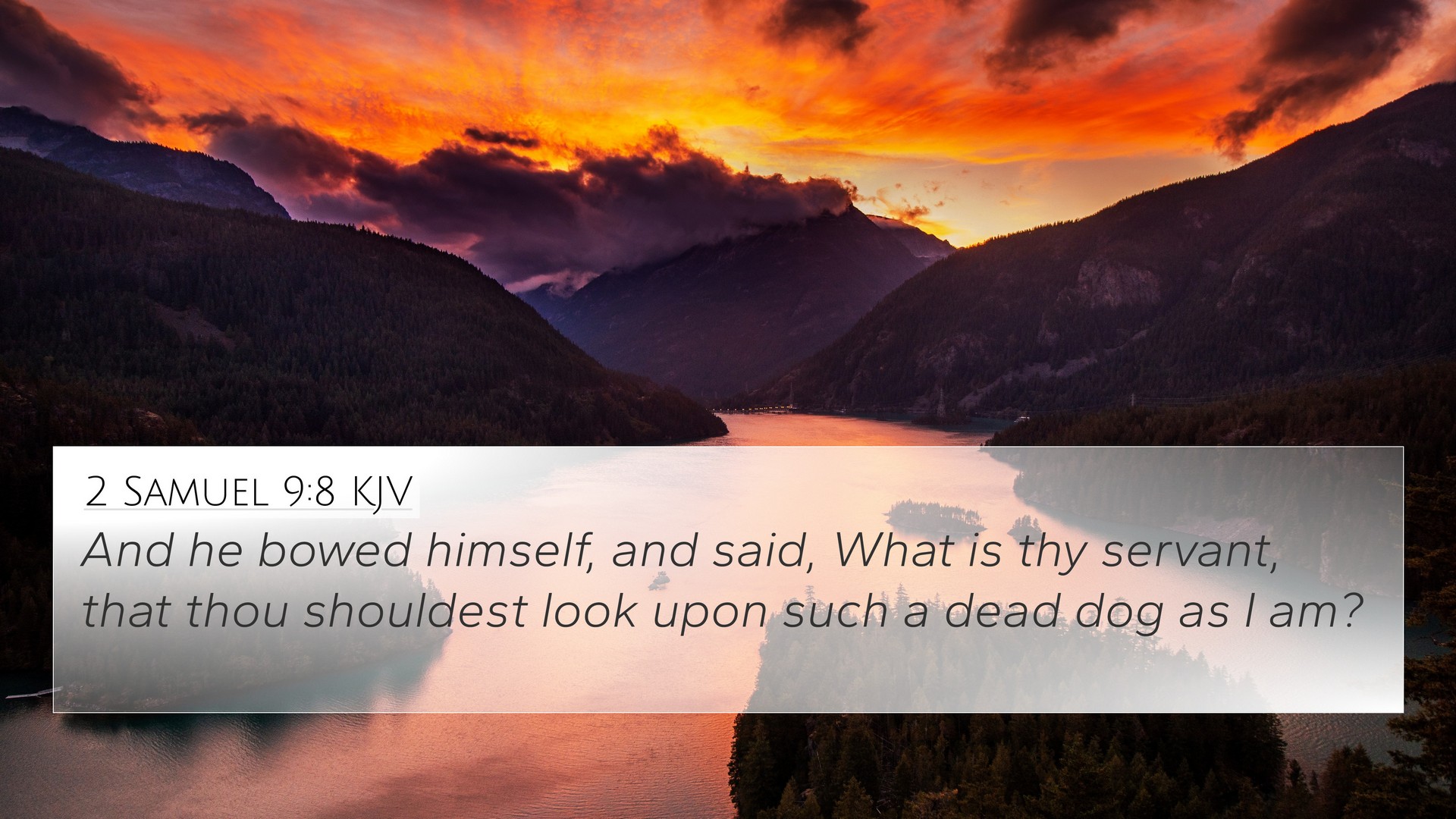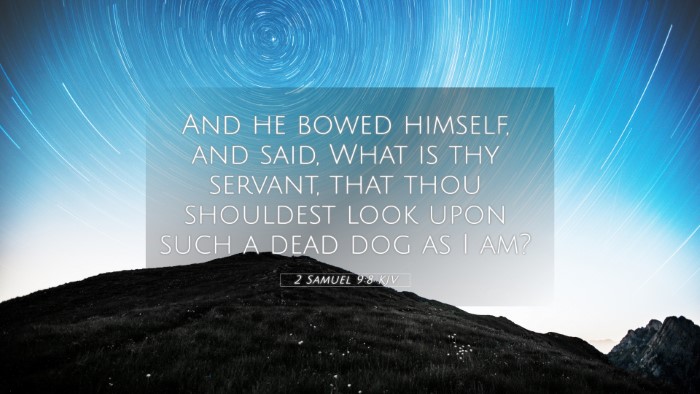Old Testament
Genesis Exodus Leviticus Numbers Deuteronomy Joshua Judges Ruth 1 Samuel 2 Samuel 1 Kings 2 Kings 1 Chronicles 2 Chronicles Ezra Nehemiah Esther Job Psalms Proverbs Ecclesiastes Song of Solomon Isaiah Jeremiah Lamentations Ezekiel Daniel Hosea Joel Amos Obadiah Jonah Micah Nahum Habakkuk Zephaniah Haggai Zechariah Malachi2 Samuel 9:8 Similar Verses
2 Samuel 9:8 Cross References
And he bowed himself, and said, What is thy servant, that thou shouldest look upon such a dead dog as I am?
Uncover the Rich Themes and Topics of This Bible Verse
Listed below are the Bible themes associated with 2 Samuel 9:8. We invite you to explore each theme to gain deeper insights into the Scriptures.
2 Samuel 9:8 Cross Reference Verses
This section features a detailed cross-reference designed to enrich your understanding of the Scriptures. Below, you will find carefully selected verses that echo the themes and teachings related to 2 Samuel 9:8 KJV. Click on any image to explore detailed analyses of related Bible verses and uncover deeper theological insights.
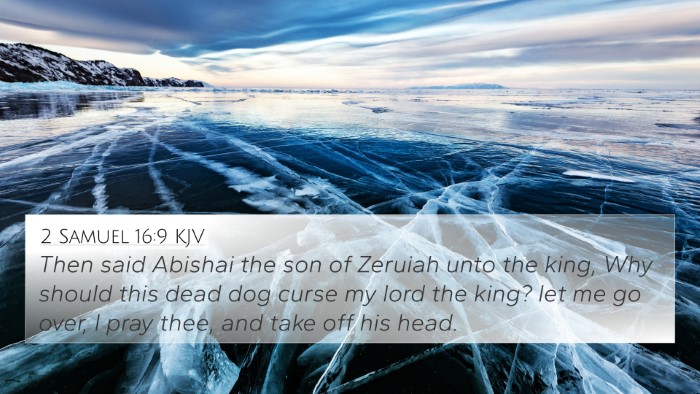
2 Samuel 16:9 (KJV) »
Then said Abishai the son of Zeruiah unto the king, Why should this dead dog curse my lord the king? let me go over, I pray thee, and take off his head.

1 Samuel 24:14 (KJV) »
After whom is the king of Israel come out? after whom dost thou pursue? after a dead dog, after a flea.

Matthew 15:26 (KJV) »
But he answered and said, It is not meet to take the children's bread, and to cast it to dogs.
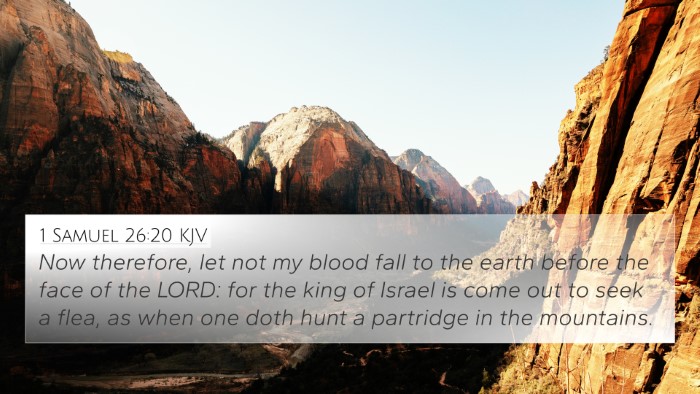
1 Samuel 26:20 (KJV) »
Now therefore, let not my blood fall to the earth before the face of the LORD: for the king of Israel is come out to seek a flea, as when one doth hunt a partridge in the mountains.
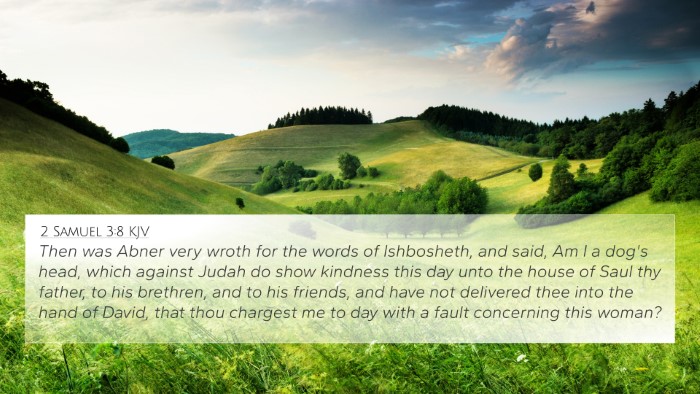
2 Samuel 3:8 (KJV) »
Then was Abner very wroth for the words of Ishbosheth, and said, Am I a dog's head, which against Judah do show kindness this day unto the house of Saul thy father, to his brethren, and to his friends, and have not delivered thee into the hand of David, that thou chargest me to day with a fault concerning this woman?
2 Samuel 9:8 Verse Analysis and Similar Verses
Understanding 2 Samuel 9:8
Verse: "And he bowed himself, and said, What is thy servant, that thou shouldest look upon such a dead dog as I am?"
Summary of Meaning: This verse encapsulates themes of humility, grace, and redemption through the story of Mephibosheth, the son of Jonathan, and grandson of Saul. It highlights the kindness David shows towards Mephibosheth despite his lowly circumstances.
Contextual Background
In the historical context of 2 Samuel, David had recently become king, and he sought to show kindness to Jonathan's descendants as a part of honoring his covenant with Jonathan. The setting is crucial as it displays David's character and God's providential care for those who are marginalized.
Verse Analysis
Mephibosheth's State: Mephibosheth refers to himself as a "dead dog." This statement illustrates his sense of worthlessness and humility. Dogs, in biblical times, were often seen as unclean and insignificant. Mephibosheth's expression shows not only his physical disability (as he was lame) but also his low social status.
Insights from Commentaries
- Matthew Henry: He emphasizes the profound nature of David's kindness. Henry notes that David's gesture was countercultural, as royals typically eliminated potential rivals. Yet, David seeks Mephibosheth, showcasing grace.
- Albert Barnes: Barnes discusses the significance of covenant loyalty. He argues that David's actions reveal the faithfulness of God’s promises, reflecting the deeper covenant relationship between families.
- Adam Clarke: Clarke highlights the emotional weight of Mephibosheth's response. His self-depreciation represents a heartfelt recognition of David's grace. Clarke links this humility with the broader biblical theme of humility before God.
Thematic Connections
This verse connects strongly to several biblical themes:
- Grace: Just as David showed grace to Mephibosheth, God extends grace to sinners.
- Humility: The lowly position of Mephibosheth serves as a reminder of the biblical call to humility.
- Covenant Love: It illustrates the importance of faithfulness to one’s word as exemplified by David.
Cross-References
This verse is inter-connected with several other scriptures. Here are some notable Bible verse cross-references:
- 1 Samuel 20:14-15: Jonathan's covenant with David wherein he asks David to show kindness to his descendants.
- Psalms 113:7-8: God's care for the poor and needy, paralleling David's actions.
- 2 Samuel 19:24-30: Further interactions between Mephibosheth and David, showcasing the ongoing relationship post-restoration.
- Luke 14:21: The parable of the great banquet, which parallels the invitation extended to the least deserving.
- Matthew 25:40: "Inasmuch as you have done it unto one of the least of these my brethren, you have done it unto me," underlining the theme of kindness to the lowly.
- Ephesians 2:1-10: Describes the concept of grace in the New Covenant, showing how like Mephibosheth, all have fallen short.
- Romans 5:8: God shows His love by dying for the ungodly, a direct connection to the theme of grace evident in David's kindness.
Conclusion
2 Samuel 9:8 offers profound insights into grace and humility, encouraging believers to reflect on these virtues in their own lives. The narrative serves as a reminder of God's unwavering faithfulness and the importance of kindness to those who are vulnerable. Through a comprehensive Bible cross-reference approach, one can deepen their understanding and explore the interconnectedness of scriptures.
